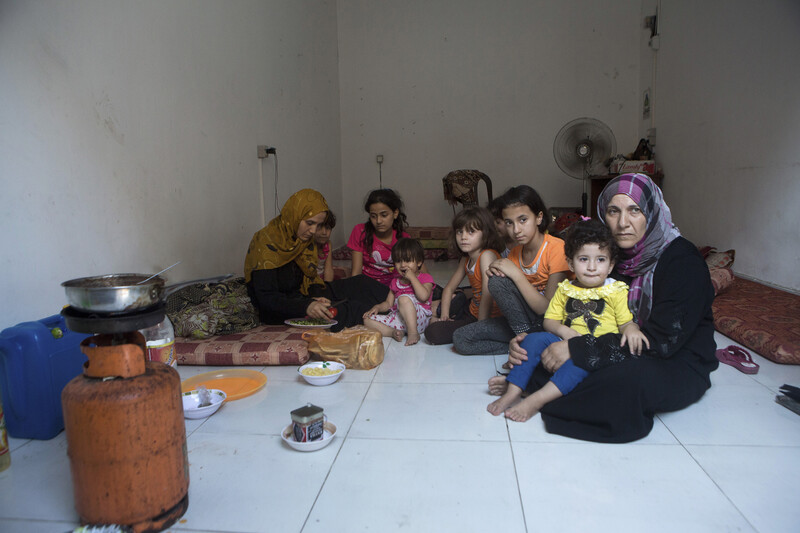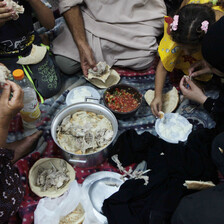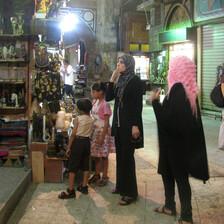The Electronic Intifada Gaza Strip 25 July 2014

A family from Beit Hanoun in northern Gaza takes refuge in a store in nearby Jabaliya on 24 July.
ActiveStillsIt has been one more day without water or electricity in Gaza as Israeli soldiers continue their attacks. Since the attacks began more than two weeks ago, Israel has killed 865 Palestinians.
Many have been slaughtered inside their homes or schools run by the United Nations. Nowhere is safe.
“Rami, can we switch on your small power generator, please?” my brother-in-law, Sami, asked me yesterday while I looked for the jugs of water we recently filled. “We seem to have water running in the pipes now.”
I told him to go ahead and switch on the power generator, hoping it would work. Yes, it did work. Water was pumped into the tanks of Sami’s house, which is on the outskirts of the Nuseirat refugee camp.
I have fled here, to Sami’s home, with my four children and my wife. We have been forced out of our own home in central Gaza.
Intense heat
We have been at Sami’s for a few days now. It was only yesterday that my children and I were able to take brief showers. It is July, and the summer heat is very intense in Gaza.
On Wednesday, the electricity was cut off for the entire day. My family, my brother-in-law and my sister, as well as Sami’s brother’s family — almost twenty of us — endured a new day of struggling not just to cope with this situation, but with Israel’s continuous airstrikes, too.
With the electricity out and my energy depleted, I accepted an offer from Al Jazeera English to appear for an interview on their Inside Story program. Al Jazeera has studios in Gaza City, about 15 kilometers away from Sami’s house.
But it is too dangerous to travel by road — Israel indiscriminately strikes every moving object on the streets and roads of Gaza these days.
I told the producer that I would need about thirty minutes to prepare, so that I could set up a laptop and switch on my small power generator. I wasn’t sure whether my equipment would cooperate. But it did, and I was able to join the program.
Later in the day, Free Speech Radio News, the US radio program with which I have worked for many years, called me for an interview. Again, I had to switch on my power generator, but the interview was done successfully — even while Israeli drones buzzed overhead.
The power supply for the Gaza Strip has been increasingly limited for the past few days. Israeli air strikes have damaged Gaza’s only power plant.
Generosity
My brother-in-law has been so welcoming to me and my family. He’s been a very good host. He and his brother, who lives in the same building, have hardly been getting by. But neither of them ever complain about it.
This house is like the thousands of Palestinian households across the occupied Gaza Strip right now. In the neighborhood where I am staying, I saw some people from my hometown of Maghazi.
They are probably being hosted by relatives or friends, as Maghazi is under intensive attack.
In this situation, I can only meet Sami’s generosity with my own. I’m providing extra food, which I can afford.
In Gaza, the Israeli siege — which has been in place for eight years — has made tens of thousands of workers jobless.
My brother-in-law, for example, used to work in textiles for years, but has been unemployed much of the time lately. He can only make ends meet by accepting the occasional odd job offers he has received.
Trickle
Thousands of other Gaza households under intensive Israeli attacks have opted to seek refuge in schools run by UNRWA, the UN agency for Palestine refugees, as economic hardships make it difficult for families to host others inside their homes.
A statistic from UNRWA illustrates how impoverished the people of Gaza have become. Approximately 80,000 people in Gaza sought food aid from the UN in 2000. Today, the figure is more than 830,000 — from a total population of 1.8 million.
There are more than 140,000 internally-displaced Palestinians — with the border sealed, no one can flee Gaza — who have sought shelter in 83 schools.
Four schools have been attacked by Israel in as many days. One such attack was in Beit Hanoun in northern Gaza on Thursday. At least 16 people were killed.
Schools are unsafe places to be. Israel bombs women and children without compunction.
Anxiety
“Dad, when will these attacks stop? I want to go back to Maghazi, I want to go back. When can we go back?”
My son Munir, who is 15, asked me these questions yesterday.
Along with my other children, my son has stopped his daily routine during the holy month of Ramadan. Normally, we all enjoy a month of relaxation during Ramadan, a month during which I get to spend more time with my kids.
Normally, we would all gather around the television to watch entertaining shows. We receive lovely visits from relatives. These traditions have all stopped over the past weeks.
The sounds of Israeli airstrikes and scenes of atrocities on television have replaced these precious moments.
Normally during Ramadan, my children, Mohammad, 8, and Nadine, 11, come over to me while I drink coffee, following a long day of fasting, to ask for some money so that they can buy something sweet from a grocery store.
But here, at Sami’s house, we have had to abandon our Ramadan routines.
Sami’s brother, Nahed, tells my children and his children to stop screaming. Everybody in the family seems to feel unwell, as anxiety and tension rises. We regularly hear the sounds of airstrikes.
I have encouraged Nahed to leave them alone, thinking that maybe letting off some steam would help reduce their stress levels.
My son Mohammad lightly injured his ankle as he stepped up on the house’s staircase, something he has not done before. In my Maghazi home, we have the same exact staircase.
On Wednesday, my eight-year-old nephew, Saed, along with his two brothers and little sister, was here with us in Sami’s house before their father asked them to return to Maghazi.
It was Saed’s birthday, and I wanted to have a party. But no one wanted to celebrate. I wanted to help ease the anxiety of the children in the house, to give them some sort of relief.
Not everyone can be strong all the time, particularly in these moments.
Painful decisions
On Wednesday, that same day, I was supposed to accompany my chronically-ill wife to a hospital in Jerusalem, where she was due to receive medical attention. “My God,” I said to myself, “please help me to make the right decision under these conditions.”
On the one hand, I feel worried about my wife, whose latest medical tests indicate that she will have to undergo critical radiation therapy. On the other hand, I am extremely worried about my children, my mother, my brothers and my sisters. How could I leave them all and focus on my wife’s condition?
In the end, I decided not to head for Jerusalem. We would have to use roads that lead to the Israeli-controlled Erez crossing at Gaza’s northern boundary with Israel.
Perhaps riding in a taxi would prove disastrous for us. Or maybe, if we were in Jerusalem, we would be too worried about our children back in Gaza.
My wife’s doctor in Jerusalem said that they could change her appointment, and she would have to take painkillers until we’re able to travel for her treatment. The delay is totally out of my hands, I explained to him.
In order for me to wrap up this story, I will have to switch on the power generator for the third consecutive time in one day. Running the power generator is not such a good idea, actually — it is now two hours after midnight, and no one in the neighborhood is running their own power generator.
Gasoline is highly expensive, and breaking the silence with the loud hum of the generator adds more stress to an already stressed-out population. But I have to do my job and report whatever I can to the outside world.
Rami Almeghari is a journalist and university lecturer based in the Gaza Strip.





